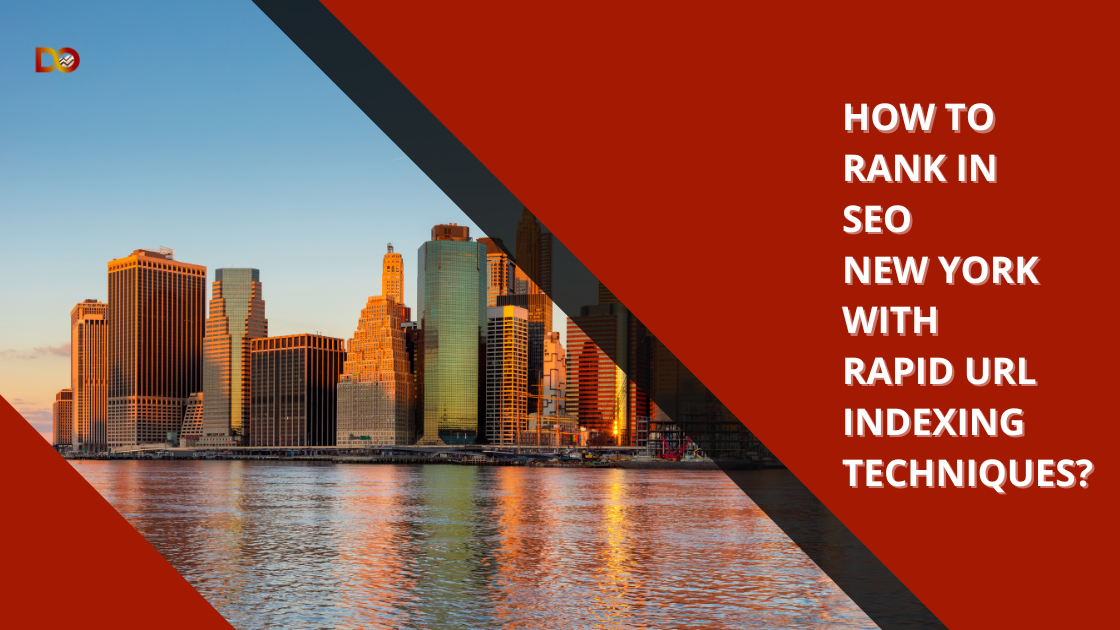Ranking high in search results is a top priority for businesses competing in New York’s digital market. But in a city where every second counts and competition is fierce, waiting days—or even weeks—for Google to index your content can mean lost visibility and missed opportunities.
To truly succeed with SEO in New York, you need more than optimized content—you need speed. Rapid URL indexing techniques allow search engines to discover your new pages faster, helping you rank sooner and gain an edge in high-traffic local searches.
This guide explores how rapid indexing fits into a broader SEO experts’ strategy tailored for New York in 2025. From indexing APIs and automation to local optimization, you’ll learn practical steps to rank faster and more effectively in one of the most competitive markets in the world.
Rapid URL Indexing Techniques
Fast indexing is a crucial component of any high-performance SEO strategy—especially in competitive markets like New York. Delayed indexing means lost visibility, missed traffic opportunities, and a slower return on content investment. Fortunately, there are several proven techniques that SEO experts use to accelerate the indexing process. Each one plays a role in helping search engines discover, crawl, and rank your content efficiently.
- Indexing APIs and Protocols
Today, SEO experts use indexing APIs to tell search engines directly when new content is added or changed. This allows your website pages to get indexed much faster.
Google’s Indexing API is particularly useful for specific types of content, such as job listings or livestreams, but it can also be beneficial for high-priority pages. IndexNow, used by Bing and other search engines, allows one to update alerts on multiple platforms simultaneously.
These tools skip the usual waiting period and help your content show up in search results quickly. SEO experts often set up automated systems to send these alerts without manual effort.
Tip: Use indexing APIs, especially for time-sensitive content like promotions or service updates.
- Sitemap Creation and Submission
A sitemap is a file that tells search engines which pages are on your site and when they were last updated. Submitting this sitemap to Google Search Console and Bing Webmaster Tools helps your pages get crawled and indexed properly.
Updating your sitemap every time you add new content ensures search engines know about the changes.
Tip: Keep your sitemap organized and under 50,000 URLs. Divide it into sections like blog posts, services, and locations for better crawling.
- Internal Linking Structure
Internal links help search engines find and understand new pages. By linking new content from existing high-traffic pages, you guide search engines to those new pages faster.
For example, if you publish a new blog post about “Luxury Apartments in Brooklyn,” it’s helpful to link to it from an existing page like “NYC Rental Listings” or “Apartments by Borough.” This shows search engines that your new content is connected to valuable property-related topics and helps prioritize indexing.
SEO experts often perform internal link audits to ensure important listings, guides, or service pages are properly linked and easy for users to navigate.
Tip: Use descriptive anchor text like “Brooklyn luxury rentals” instead of generic terms like “read more,” so both users and search engines understand the link’s context.
Read more : How to Choose the Right Real Estate SEO Agency
- Social Signals and Content Sharing
While social media activity doesn’t directly affect rankings, it helps search engines find your new pages sooner. Sharing your content on platforms like LinkedIn, Twitter, and local forums can lead to faster discovery.
If your content is popular, it may attract backlinks, mentions, or increased visits, which helps with faster indexing and better rankings. SEO experts often include social sharing as part of a broader indexing and content promotion strategy to amplify reach.
Tip: Use hashtags like #NYCLawyer or other relevant local tags when sharing content to attract nearby users and increase your visibility in targeted search results.
- Automation and Pinging
Automating indexing alerts means search engines are notified whenever you publish or update content. This keeps your site active in their eyes and helps avoid delays.
Here are some ways to automate it:
- RSS Feeds: These update automatically and alert search engines.
- Ping Services: These send alerts when something new is posted.
- CMS Tools: Platforms like WordPress can ping search engines automatically.
- Custom Scripts: Developers or SEO experts can create automated systems that send alerts whenever you publish a new page.
Tip: Always use correct canonical tags and schema markup along with these tools to avoid duplicate indexing.
Why Do These Techniques Matter?
In a fast-moving market like New York, every minute counts. If you wait for search engines to find your content naturally, you’re likely to miss out on valuable traffic.
Using these indexing methods ensures your new pages show up faster, which helps you generate leads, drive traffic, and improve rankings more efficiently. An SEO company often uses a combination of these tools to build a strong, quick indexing system.
Whether it’s a new blog post or a local service update, faster indexing gives your content the best chance to succeed.
Understanding New York SEO in 2025
New York’s search landscape is very location-focused. Most mobile users search with specific areas in mind. This means local SEO services have become essential.
To rank well in these local searches, you should:
- Optimize your Google Business Profile
- Use location-based keywords
- Keep your business name, address, and phone number consistent everywhere
- Create content that answers location-specific questions
In addition to location, user intent is critical. Google ranks content not just by relevance but by how well it satisfies what the user is looking for. A strong SEO services strategy guided by experienced SEO experts must address three core types of intent:
- Informational: Users are researching or learning. Provide helpful content like guides, FAQs, or tips.
- Navigational: Users want to find a specific business or page. Make sure your site is easy to navigate with clear menus leading to service pages, contact info, or location-specific details.
- Transactional: Users are ready to take action. Place strong calls-to-action (CTAs) like “Book Your Consultation” where they are easy to find and click.
SEO Trends for 2025
Staying ahead in SEO means adapting to the latest trends—and in 2025, search engines are getting smarter and more user-focused. If you want your site to rank in competitive areas like New York, these updates must be part of your SEO strategy:
- AI Summaries: Google may show summaries of your content in search results. Make sure your writing is clear and well-structured.
- Voice Search: People are asking longer, natural questions like “Who offers the best dental services near me?” Use similar phrases in your content.
- E-E-A-T (Experience, Expertise, Authoritativeness, Trustworthiness) Signals: Show your experience, expertise, authoritativeness, and trustworthiness. Add reviews, credentials, and examples of your work.
By aligning your content with these SEO trends while also applying rapid indexing techniques and local optimization, you can significantly improve your visibility in search results and maintain long-term performance in highly competitive areas.
Conclusion
Getting noticed online in New York is tough—but not impossible. With smart SEO strategies and fast indexing techniques, you can rise above the competition. Using tools like indexing APIs, optimized sitemaps, internal linking, social sharing, and automation, you make sure your content appears in search results quickly.
Combine these methods with a local-first approach and the latest search trends, and you create a strong path toward higher rankings. Whether you’re a startup or a growing business, fast visibility leads to more traffic, better leads, and stronger growth.
If you’re ready to take your SEO to the next level, Devoptiv offers expert SEO services that include technical setup, local optimization, and indexing strategies tailored for New York’s fast-paced market.
Book your free consultation with Devoptiv’s SEO experts and get started today!
FAQs
- How long does it usually take for a new page to appear in Google?
Without any indexing strategies, it may take days or even weeks for Google to notice and index your new page. However, using tools like indexing APIs, updated sitemaps, and automation techniques can significantly speed up the process.
- Do I need to be a developer to use indexing APIs?
While indexing APIs involves some technical setup, you don’t need to be a developer to benefit from them. Most SEO companies handle the integration and automation for you. This means your site can still take advantage of fast indexing without needing in-depth coding knowledge or hands-on configuration.
- Why is internal linking important for SEO?
Internal links guide both users and search engine bots through your website. They help search engines discover new pages faster and distribute ranking authority across your site. Proper internal linking also improves user experience by connecting relevant content, which keeps visitors engaged and encourages them to explore more pages.
- Does social media help with indexing?
Yes. Sharing your content on platforms like LinkedIn or Twitter increases exposure and drives traffic. Search engines often crawl these platforms, so if your content gains engagement or backlinks, it can be discovered and indexed sooner. Social sharing supports faster visibility even if it’s not a direct ranking factor.
- What is the difference between indexing and ranking in SEO?
Indexing means your page has been found and added to a search engine’s database. The ranking is where your page appears in search results. A page must be indexed before it can rank, so fast indexing is the first step toward improving your visibility and driving traffic.
- What role does content structure play in rapid indexing?
A: Well-structured content—with headings, bullet points, and clear sections—makes it easier for search engines to crawl and understand your page. Clean formatting, internal links, and proper HTML tags all contribute to faster indexing and help search engines recognize the page’s relevance to specific search queries.







